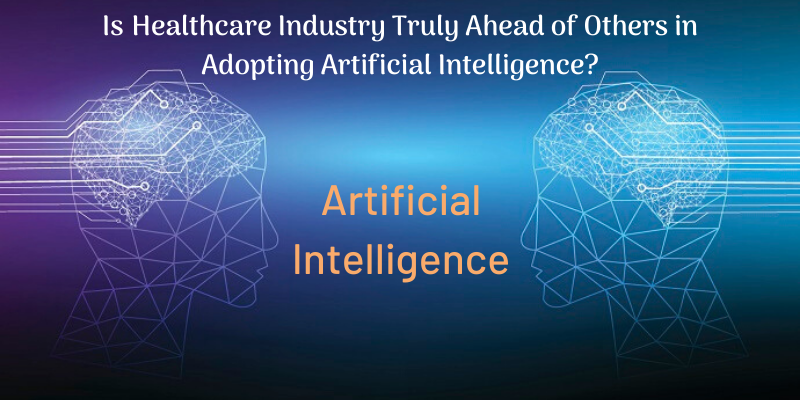
Artificial intelligence for healthcare – Artificial intelligence has earned quite a reputation for itself all across the globe. Ever since the idea was conceived back in the 1940s, there is a lot that has taken shape ever since. This directly means a lot of significant research has gone into exploring the many faces of artificial intelligence and deriving insights from it that have the potential to bring about the change. Today, AI’s biggest niches machine learning is being explicitly used in every corner and industry of the world to make an impact.
The Adoption of Artificial Intelligence
Artificial intelligence is bringing about drastic transformations around the world and helping industries become more efficient and self-dependent in their processes. If you look at it closely, one of the most fundamental tasks that it is doing is removing the burden of manual work from the shoulder of people and making them focus on cognitively advanced tasks such as analysis and decision making.
Examples of artificial intelligence in healthcare – In spite of the fact that artificial intelligence has experienced resistance in every industry at first, leaders are beginning to realize its importance now. Take the business as an example. With digitization sweeping organizations and enterprises off their feets, businesses started blaming technology as the biggest disruptor of the modern era. And since they had to give up their traditional processes and become one with the digital, they hated emerging technologies like artificial intelligence even more.
However, those who harness artificial intelligence and used it to answer some of the biggest business questions and issues experienced a multitude of profitability. They were able to cater to the requirements of their customers more efficiently and also managed their departments with greater precision and visibility.
Now coming back to the healthcare sector, the industry has seen one of the biggest resistances to artificial intelligence. Be it, doctors or other medical staff, the technology made it appears as if it was coming after their jobs. However, this wasn’t the case that researchers planned on before adopting it for various purposes. One of the biggest shortcomings of technology indeed was that it focused more on innovating rather than solving the existing problems of the industry. And when you do that, there is nothing that can stop you from appearing as a disruptor.
Creating Efficiencies
What is artificial intelligence in healthcare – To bring transformations in their true sense, technologies like artificial intelligence need to analyze closely the problems that are prevalent in the healthcare industry. They must ask questions like, what is the industry truly trying to solve? And as a technology, how can we create a difference or simplify it.
Benefits of artificial intelligence in healthcare – While those who have gone past their fears of artificial intelligence taking over, surely experience benefits, just like organizations do in the business sector. According to recent research by KPMG, 89 percent of the healthcare executives say that artificial intelligence is ultimately creating efficiencies in their system.
A lot of people believe that the healthcare industry is far ahead in adopting artificial intelligence than any other industry. However, according to the same research 37 percent of medical professionals also highlighted the fact that the pace of implementation of AI is too slow.
The 57 percent of the respondents, who believe that the industry is ahead, want more rapid changes to take place. The fundamental belief is that artificial intelligence is not being adequately adopted due to factors like cost, training, privacy etc. However, the need for a more rigorous adoption of the technology across the industry demonstrates the need that people are appreciating the value that AI is creating.
Melissa Edwards, managing director, digital enablement, at KPMG highlights the fact that the pace with which medical institutions across the world have utilized artificial intelligence and automation has tremendously increased since 2017. The medical literature is also showing the proof that that AI is evidently helping clinicians.
Most importantly, the aim of artificial intelligence is to create an impact that delivers care to patients. For the longest amount of time, the measurement of success in a medical institution has been to see the number of patients. However, AI is changing this approach by introducing the concept of quality in care delivery. 91 percent of the medical experts who participated in the survey believed that AI is increasing the access of the patient to care services.
Artificial intelligence is trying to be more patient-focused in the industry that is already clinic focused. By helping in diagnosis and better decision making, the technology is shaping the dynamics between the patient and the doctor, only to make it more effective and precise.
Conclusion
Future of artificial intelligence in healthcare – As healthcare progresses towards a future that has more than a few challenges to solve, the biggest of which is population care management of the rapidly increasing population, the intervention of technology seems inevitable. With the assistance of artificial intelligence, not only will the patient management system of healthcare sector experience true growth and enhanced services but also save more than a few lives that have been lost due to negligence and operational inefficiencies.
